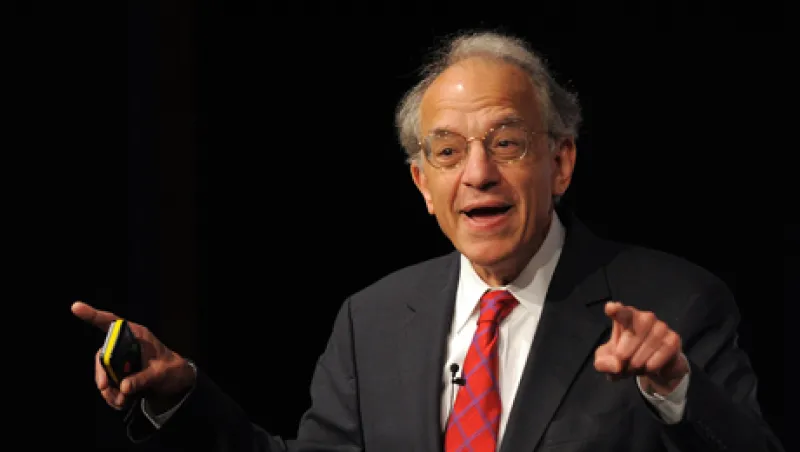Lately, financial market investors have been abuzz with concern about exchange-traded funds. ETFs have become a favorite tool for hedge fund managers because they replicate entire indexes the way mutual funds do but at a generally lower cost and with greater flexibility. They can be traded throughout the day, unlike mutual funds, which only can be traded after the markets close. That allows investors to quickly get in and out of entire asset classes or markets.
Some critics say the rising use of ETFs increases correlation among stocks and hence volatility. There also have been concerns that some ETFs, especially in Europe, use derivatives to synthetically replicate an index. This technique is easier and cheaper than buying the underlying assets, especially in credit markets where certain securities can be difficult to obtain. Synthetics also may raise market risk, because of the disparity between the prices of the derivatives and the underlying securities, according to some critics. In October, Robert Litan and Harold Bradley, respectively the vice president of research and policy and CIO of the Ewing Marion Kauffman Foundation, laid out those concerns in prepared testimony before the U.S. Senate. “While ETFs began as a constructive financial innovation over 18 years ago, they have grown so fast in number and in variety that they now account for roughly half of all the trading in U.S. equities markets today,” Litan and Bradley wrote. “In the process, in our view, ETFs have increasingly distorted the role of equities markets in capital formation, while posing systemic risks from potential settlement failures.” Their main concern: ETFs are increasingly driving the pricing of individual stocks, rather than the other way around.
Not surprisingly, the ETF industry says those concerns are off-base and way overblown. Institutional Investor Contributing Writer Steve Rosenbush spoke with Jeremy Siegel, a finance professor at the University of Pennsylvania’s Wharton School and an adviser to ETF sponsor WisdomTree. Here are edited highlights of the conversation:
Institutional Investor: In your view, what is the relationship between the volatility of today’s financial markets and the growth of the ETF industry?
Siegel: The volatility we see in today’s markets is not linked to those ETFs. A lot of people who own inverse funds see declining returns, and they don’t understand that the returns are supposed to go down. They don’t understand that inverse funds may be well correlated with oil prices on a day-to-day basis, but over time they get a deteriorating asset. It is sort of like a put. It’s hard to explain to investors. You don’t have a sudden downside, but the price you pay for that is a deteriorating asset. I don’t think ETFs raise the level of systemic risk at all. I don’t understand the mechanism. The size of the ETF industry is still very small compared to mutual funds.
You don’t agree that synthetic ETFs and inverse leveraged ETFs create more financial market risk?
The risks are borne by the buyer. All those risks should be advertised to the potential buyer. We tend not to use inverse and multiple leverage ETFs in the U.S. Some investors do want ETFs based on futures. If the futures are less liquid, potentially there will be a problem. But if an ETF owns futures in a less liquid market, that should be advertised as one of the risks to investors.
To what extent does WisdomTree make use of synthetic structures?
We own the “physical” assets in all cases with stock funds. The first funds we issued were based on dividends and earnings. We branched out and broadened our space, but those remain our core products.
I looked at the stock from 1957 to the present. We did an exhaustive study, and the evidence was pretty overwhelming that dividend-paying stocks outperformed the market, and also did well in bear markets and provided downside protection. Last year the bear market hit dividend-paying stocks hard because the financial institutions were hit so hard. But the argument for dividend-paying stocks is far more true than not.
What is the argument for using ETFs instead of mutual funds?
Obviously, the fees are generally much lower than the fees for any of the mutual funds. I think one of the most important things about ETFs is that you can trade them any time you want. I am a big fan of Vanguard, but if you start trading out of their index funds, you get phone calls from them; they want to keep you in. If you are an ETF investor and you feel you want to sell, you go out and sell. If you want to buy back in two minutes later, you can do that too. I think that is a tremendous advantage.
It’s a flexibility that investors and advisers have in terms of changing the portfolio, and a lot of products are much cheaper than standard mutual funds. You get more exposure to sectors and styles, and you can just buy into them at any time. There was a scandal with mutual funds trading after hours five or six years ago. They were playing games. Some investors could trade, and some could not. That cannot happen with ETFs.
Why wouldn’t an investor pay more for an actively managed fund?
Most mutual funds are run by managers trying to pick winning stocks. We know from empirical research that after fees are charged, most give no value to investors. Timing the market is very difficult. Some can do it. But finding stocks that can outperform the market is hard.
The record of mutual funds is just not good outside of the index funds, the plain-vanilla funds. They are all market-cap-weighted, versus ours, which are dividend- and earnings-weighted.






